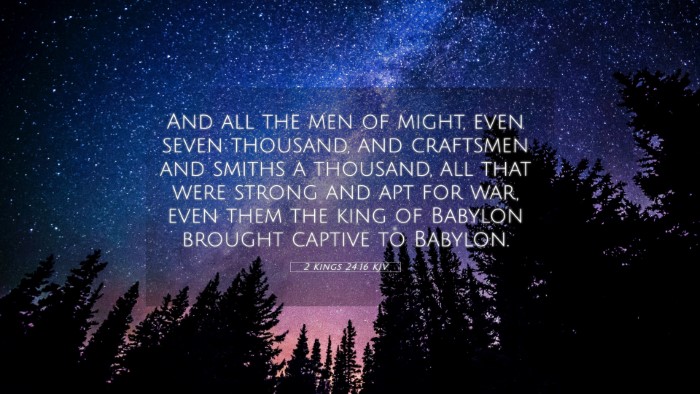Old Testament
Genesis Exodus Leviticus Numbers Deuteronomy Joshua Judges Ruth 1 Samuel 2 Samuel 1 Kings 2 Kings 1 Chronicles 2 Chronicles Ezra Nehemiah Esther Job Psalms Proverbs Ecclesiastes Song of Solomon Isaiah Jeremiah Lamentations Ezekiel Daniel Hosea Joel Amos Obadiah Jonah Micah Nahum Habakkuk Zephaniah Haggai Zechariah Malachi2 Kings 24:16 Similar Verses
2 Kings 24:16 Cross References
And all the men of might, even seven thousand, and craftsmen and smiths a thousand, all that were strong and apt for war, even them the king of Babylon brought captive to Babylon.
Uncover the Rich Themes and Topics of This Bible Verse
Listed below are the Bible themes associated with 2 Kings 24:16. We invite you to explore each theme to gain deeper insights into the Scriptures.
2 Kings 24:16 Cross Reference Verses
This section features a detailed cross-reference designed to enrich your understanding of the Scriptures. Below, you will find carefully selected verses that echo the themes and teachings related to 2 Kings 24:16 KJV. Click on any image to explore detailed analyses of related Bible verses and uncover deeper theological insights.

Jeremiah 52:28 (KJV) »
This is the people whom Nebuchadrezzar carried away captive: in the seventh year three thousand Jews and three and twenty:

2 Kings 24:14 (KJV) »
And he carried away all Jerusalem, and all the princes, and all the mighty men of valor, even ten thousand captives, and all the craftsmen and smiths: none remained, save the poorest sort of the people of the land.

Jeremiah 29:2 (KJV) »
(After that Jeconiah the king, and the queen, and the eunuchs, the princes of Judah and Jerusalem, and the carpenters, and the smiths, were departed from Jerusalem;)
2 Kings 24:16 Verse Analysis and Similar Verses
Understanding 2 Kings 24:16
2 Kings 24:16 states: "And all the men of the war, even the seven thousand, and craftsmen and smiths a thousand, all that were strong and apt for war, even them the king of Babylon brought captive to Babylon."
This verse plays a crucial role in highlighting the consequences of disobedience to God and the eventual downfall of the Kingdom of Judah, encapsulating a historical moment where the elite and skilled members of society are taken into captivity. Below is a summarized interpretation based on public domain commentaries by Matthew Henry, Albert Barnes, and Adam Clarke.
Historical Context
The background of this verse portrays the period of conquest by Babylon under King Nebuchadnezzar. This event is part of the siege of Jerusalem, resulting in not just the loss of life but the significant loss of skilled individuals, which would have long-lasting implications for the nation of Judah.
Matthew Henry emphasizes the spiritual abandonment of the people leading to such a perilous outcome, while Adam Clarke elaborates on the socio-economic ramifications—loss of craftsmen and military power intensifies the vulnerability of the remaining population.
Thematic Insights
This verse serves as a poignant reminder of the themes of judgment and exile. The taking away of "all the strong men" signifies not just military defeat but the stripping away of national identity and strength.
- Disobedience and Judgment: A direct consequence of Judah's defiance against God.
- Loss of Identity: The elite being taken captive represents a loss of cultural identity and future leadership.
- Hope Amidst Despair: While this event marks a low point, it also sets the stage for future restoration as seen in the prophecies of Jeremiah and eventual returns as noted in Ezra and Nehemiah.
Cross-References
The significance of 2 Kings 24:16 can be further understood through its inter-biblical connections. Here are some relevant cross-references:
- 2 Kings 25:11-12: Discusses the remaining people after the exile.
- Jeremiah 39:9: Accounts of captives taken to Babylon providing a deeper narrative.
- Ezekiel 1:1: Reference to the captives living in Babylon and receiving visions.
- Daniel 1:3-4: Mentions the young men taken to serve in Babylon, linking the themes of captivity and influence.
- Isaiah 39:6: Prophecies against Judah that culminate in Babylon's conquests.
- Lamentations 1:3: Reflects the state of those left behind in Jerusalem.
- Zephaniah 1:4: God's judgment against Judah, reiterating the reasons for the Babylonian exile.
Lessons and Applications
The message from 2 Kings 24:16 can serve as a lesson in the importance of faithfulness and reliance on God during trying times. As noted in the combined insights from the old and new commentaries:
- Cultural Reflection: Just as Judah faced the consequences of their disobedience, modern believers are reminded of their need for alignment with God’s will to avoid spiritual captivity.
- Legacy of Faith: The battle of bearing witness to faith amidst societal decline resonates through generations, encouraging personal integrity and collective worship.
- Hope in Restoration: Even in the direst circumstances, God provides hope for redemption, mirrored throughout Biblical narratives.
Conclusion
2 Kings 24:16 is not just a historical account; it serves as an admonition of the profound relationship between disobedience and judgment, with each individual being called to reflect on their own spiritual condition. The integrated themes from this verse highlight the need for spiritual vigilance and a collective faith that transcends tumultuous times, among the family of faith.


